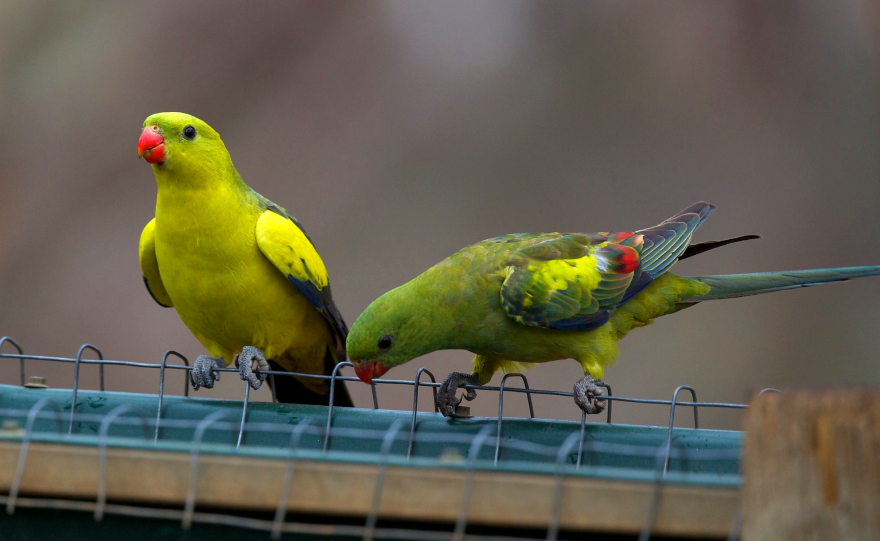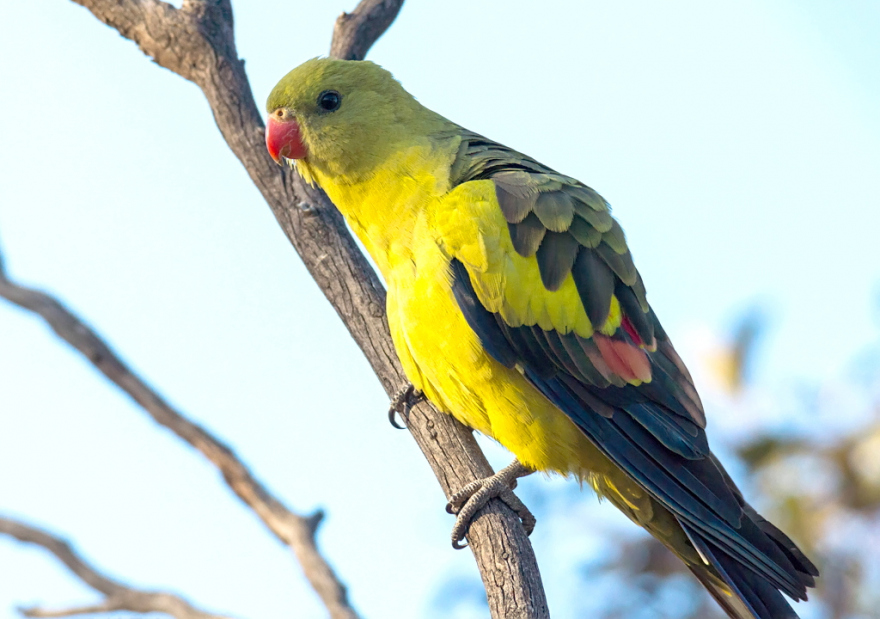The regent parrot is a medium-sized parrot found in wooded subtropical regions in Australia. There is a subspecies found in Western Australia and one found in southeastern Australia. Although uncommon in aviculture, the species is hardy and well-suited to life in a large aviary.

Housing & Compatibility
Regent parrots are placid birds that can be kept as a “flock” with multiple pairs per aviary, or as a single pair in a mixed collection with other placid species. As they’re quite large, housing them with finches is fraught with danger, so stick to larger birds such as doves and neophema parrots.
Regent parrots should be provided with an adequate amount of flying space to ensure they receive enough exercise. Birds that do not have room to fly may suffer from stress or obesity. Four meters (12 ft) of uninterrupted flying space is recommended.
Branches from non-toxic trees should be provided as natural perches. The birds will also enjoy chewing on bark, leaves and seeds for entertainment and beak exercise.
Regent parrots are closely related to princess parrots and superb parrots. There is a potential for hybridization if these species are housed together.
Diet & Feeding
Seed forms the basis of the regent parrot’s diet. A quality mix designed for small parrots or lovebirds will be acceptable. Sprouting seed increases its nutritional value and is a cheap way to improve your bird’s health. Freshly grown green seed heads should also be offered when available.
Regent parrots also require a wide variety of fruit and vegetables to ensure good health. They enjoy sweet juicy fruits such as apple and pear, but it’s important to also provide more-nutritious green foods such as broccoli, kale and bok choi. Corn on the cob is especially enjoyed.
Commercial parrot pellets can be used as a more nutritious alternative to seed, but many birds are unwilling to consume them.
Some birds will consume insects during the breeding season. As insects are a great source of protein, live food such as mealworms or termites should be provided if the birds are willing to eat them.

Breeding Regent Parrots
Regent parrots are fairly easy to breed and generally have good fertility and hatch rates. They will typically produce only a single clutch per year, however multiple clutches do happen occasionally.
Their breeding season commences in spring as the weather begins to warm up and lasts until early summer.
Several different nesting boxes should be offered, as different pairs have differing size/shape preferences. Hollow logs are also suitable as nesting receptacles, however additional care should be taken to control vermin and parasites. A thin layer of pine shavings or sawdust should be placed inside the nestbox.
Incubation is performed exclusively by the hen and lasts for roughly three weeks. Young birds will fledge at 5 weeks of age and become fully independent from their parents 3 weeks later. Young birds can usually be housed with their parents, but they will need to be separated immediately if aggressive behavior is observed.
Sexing
Regent parrots are sexually dimorphic, meaning they can be visually sexed. Females are more green overall than males. Prior to sexual maturity, DNA sexing may be required to distinguish sexes.
Mutations
Mutation regent parrots are quite rare, but they do exist. A reddish form has allegedly been developed in Australian aviculture, but few photos exist. A “solid yellow” mutation can be found in Europe, but this form doesn’t appear to exist in Australia.
Health & Lifespan
A strict worm control regime and regular preventative treatment for bacterial and fungal infections is critical to ensure the long-term health of any bird.
A well cared for regent parrot can live in excess of 15 years.
My 2 years old flew away few months a go. I can’t stop thinking about it. I’m so sad & feel lonely , as it was very close to me. I bought a pair of untamed lorikeet , but we couldn’t get close, as they bite. I need to buy a regent , but don’t know how to keep them without making trouble…..